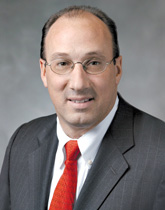
Inside First Boston Corporation's midtown Manhattan headquarters sits Bruce Witherell. The young executive is about to interview for a position in the investment bank's analyst program. It's an opportunity he covets because he knows it will put him among select company within the financial industry. It wasn't that long ago he was happy just to get his foot in the door at First Boston, working at the company's Tarrytown, N.Y., mortgage business. He'd considered the firm "very high-tech, professional"—a place that could take him where he wanted to go professionally. It was a big jump from the year he'd spent at Household Finance, doing everything from processing loans to knocking on doors collecting money. He didn't mind paying his dues there, or in Tarrytown, because he believed they were steps in advancing his career.
Getting hired by Household Finance was in itself no small feat. Frankly, he hadn't always been so attentive about his future. Going back to his high school days on Long Island, he did consider himself college material, but he wasn't particularly focused on getting good grades. Not that he was lazy. He worked hard—earning money parking cars or helping out his dad, a contractor, by doing manual labor at job sites in some of the worst areas of New York, a far cry from Manhattan office towers.
After he graduated, he enrolled in a community college, where he started making good grades. It was during freshman year that he found himself at a party with some classmates he had met. They were partying hard. Real hard. "What am I doing here?!" he suddenly asked himself. The next day, he went straight to the counselor's office for applications to more rigorous schools. He aimed high. It was "a welcomed miracle" when Carnegie Mellon's acceptance letter arrived.
When he was an industrial administration major, his ambitions began to crystallize. His new collegiate friends, with their own drive and sense of purpose, also helped him realize to set his own sights high. "I made some friends at Carnegie Mellon who truly impacted me," he says.
Looking across First Boston's conference table, Witherell thinks back on his first job interview after earning his undergraduate degree in 1982. The country was in the midst of a recession. Work was hard to find. Nevertheless, after the interview, he declined to pursue the operations management position at a steel mill. He wanted Wall Street's world of finance, not blast furnaces and soaking pits. That decision meant he had to move back home, "depressed and jobless" but with his ambitions intact.
Now, as he sits inside First Boston's conference room, it looks like his career gamble paid off. First at Household Finance, then at First Boston's mortgage company division, he'd clearly shown management his value. In his three years at First Boston, his hard work, good business sense, and honest, straightforward manner resulted in more and more management responsibility. One of his bosses knew Witherell had grand aspirations and recommended him for the analyst program—the fast track onto the Wall Street trading desk, one of the most sought-after jobs in the company and, for that matter, the industry. The recommendation led to this job interview at corporate headquarters.
Witherell sits up in the leather chair, ready to sell himself. But less than two minutes into handshakes and polite chit-chat, the interviewer leans in calmly. "You know, Bruce, I have no doubt you're a hard worker and that you can do OK in this business, but let me use an analogy you can relate to. You're like a 180-pound guy trying to be a linebacker in the NFL. Lots of heart, but I need a 225-pound guy who can run through the line."
Some candidates would have been flustered. Not Witherell. He merely utters a few choice words to himself about the executive sitting across from him.
Almost 25 years later, he laughs at the memory. He's just recently occupied a very different chair—that of the chief operating officer of the Federal Home Loan Mortgage Corporation, better known as Freddie Mac. One of two tremendous "U.S. government-sponsored enterprises" or GSEs, Freddie Mac was formed in 1970 to encourage mortgage lending. Witherell is now in charge of all three business lines as well as technical operations, overseeing the bulk of the company's more than 5,000 employees and $2.2 trillion in total mortgage assets. $2.2 trillion ... more than the annual gross domestic product of France.
That's a long way from where he was when he got out of that leather chair. He was discouraged but not defeated. He pursued another position on the trading floor, coordinating mortgage transactions. It wasn't the esteemed analyst program, but it was still Wall Street. Witherell, with strong references from his bosses, got the job. "So I move to New York City and show up one day," he recalls. "I'm on the trading desk with a thousand people around me. I'm a deal manager, no formal training. You don't have a clue what you're doing, and they tell you to close your first trade. It's the ultimate survival of the fittest."

He not only survived, he thrived, continually increasing his management responsibilities. Wall Street took notice. Within three years he had three lucrative investment banking offers. He grabbed the one from Lehman Brothers, thrilled for the chance to oversee the same type of mortgage group he'd been working in.
He had quite a welcoming his first week there. A competing firm lured away a large chunk of the workforce he'd barely met. Understandably, senior management was concerned. Witherell didn't panic. He gave assurances that everything was under control. Relying on his industry experience and contacts, he managed to find enough skilled professionals to not only fill the positions, but eventually to make operations even more efficient. "I got a reputation very quickly for being a guy who could take a problem area and fix it," he says simply.
So he hadn't been entirely surprised when Lehman's president called five years later with another management position. "He asked me, 'What do you know about derivatives?'" Witherell recalls. "I said, 'Next to nothing.' He said, 'Great—you're now running derivative finance for us.'" The president knew it wasn't about the product, even a complex product like derivatives, where contracts are based on underlying assets. It was about managing people—something Witherell had shown an uncanny proclivity for doing well.
Derivatives had been Witherell's first big move out of the mortgage arena. He couldn't have known that someday he'd be back, sitting smack in the heart of it. In fact, he'd been typically excited when asked to add on yet another unfamiliar venture—co-heading a division comprised of groups like legal, compliance, and government relations.
Now at the helm of the government-sponsored entity Freddie Mac, he's particularly grateful for that experience. "He knows how to get stuff done in a complex organization," explains his Lehman co-manager and general counsel at the time, Joseph Polizzatto, now Deutsche Bank's general counsel of the Americas. "We were able to change a lot of things through his ability to cut through bureaucracy."
Managing $2 trillion in risk at Freddie Mac is a tough job by anyone's estimation, but Witherell feels he'll "never have a harder management job" than what he lived through at Lehman Brothers. In 2000, he became the chief administrative officer of Lehman's fixed-income area, one of the company's driving financial forces. When the world came crashing down on September 11, 2001, he witnessed it all from his sixth-floor office in Three World Financial Center, the building nearest the Twin Towers. He'll never forget the shocking chaos as he exited the backdoor of his office building.
Lehman Brothers included Witherell among a core group responsible for implementing a plan to resume operations. Driving to work on September 12th with the world in tatters, he began setting up shop in the operations center across the river. His calm leadership didn't surprise Polizzatto. "He's even-keeled, a straight shooter. I'm not sure I've ever really seen him stressed out."
Witherell describes the crush of cramming more than 5,000 displaced workers into a building meant to accommodate about half that number. And the horrible view. "It was torturous on employees," he vividly remembers. "The space we went into was directly on the opposite side of the river, looking at the building we'd just been in. All day long, every day, watching it burn."
They scrambled to establish a temporary trading floor despite the myriad hurdles, from malfunctioning phones to garbage piling high in every corner. "I remember walking around that trading floor on Friday," Polizzatto says. "It was pretty impressive because when you took a step back, you realized three days ago, none of it existed." Although the world would never be the same, Lehman Brothers was ready for business when markets re-opened.
A few years later, on a Tuesday evening, Witherell walked out the company's door for the last time. He'd always been one to follow his gut, whether leaving community college for Carnegie Mellon, or returning to New York jobless after graduation. After 15 years with Lehman Brothers, he set his briefcase down the very next day at Morgan Stanley, as co-head of the domestic/global mortgage origination business and trading desk.

He wouldn't be there long. It was 2006 and an international economic storm was brewing. The following year, the housing bubble burst. Home values plunged and foreclosures spiked. By late summer 2008, the economy was teetering on the brink of disaster. Witherell found it painful to watch as his previous employer went under. Although he had his share of problems within his group at Morgan Stanley, they were manageable. However, for other areas in the firm, the problems and ensuing losses were much more significant. Witherell found himself in charge of shrinking those ailing business groups.
Meanwhile, Freddie Mac had been dealing with mounting difficulties of its own. After an accounting scandal and restatement a few years earlier, the mortgage crisis had been devastating to the tune of billion-dollar losses. Although Freddie Mac and its sister company, Fannie Mae, had been operating as publicly traded companies, the government seized control of both in September 2008, fueling further panic in the financial markets.
As the private mortgage market dried up, the government pledged a staggering $400 billion to help keep the two GSEs operating. The move kept the mortgage market afloat. Today, the two GSEs own or guarantee more than half of the country's mortgages--worth a whopping $5.5 trillion, making the health of the GSEs a critical concern for the world economy.
With such daunting responsibility, Freddie Mac needed help. The company's new CEO, Ed Haldeman, approached Witherell. He welcomed the opportunity, becoming Freddie Mac's chief operating officer. "There are some really hard parts of what we need to do here," he admits. "Some other managers might run for the hills. For me, it's like, wow, at this stage of my life, it's probably the ultimate challenge."
The challenge began officially last September. For Freddie Mac employees, a group that's suffered through six stressful years already, they can expect better days ahead, predicts Polizzatto, Witherell's former colleague at Lehman Brothers. "This is someone who can effect change seamlessly, without running roughshod over an organization."
One of Witherell's ATO fraternity brothers agrees with that assessment. Paul Fischer (HS'82), now a technical writer for PNC Corporation, has closely followed his friend's career. "Bruce is a little bit like Tom Sawyer, where he gets everyone to paint the fence, and they're glad to do it. At the end, everyone says, 'Well, how did that happen?'"
Witherell is measured in his comments about what lies ahead. He knows that in his position any public comments can have market ramifications on Wall Street. He will say this much regarding the stability of GSEs, which are essentially the "only game in town" when it comes to mortgages today: "I think it's a good time to be here, and that we will continue serving the country and come out of this in a good way."
Melissa Silmore (TPR'85) is a Pittsburgh-based freelance writer and a regular contributor to this magazine.



